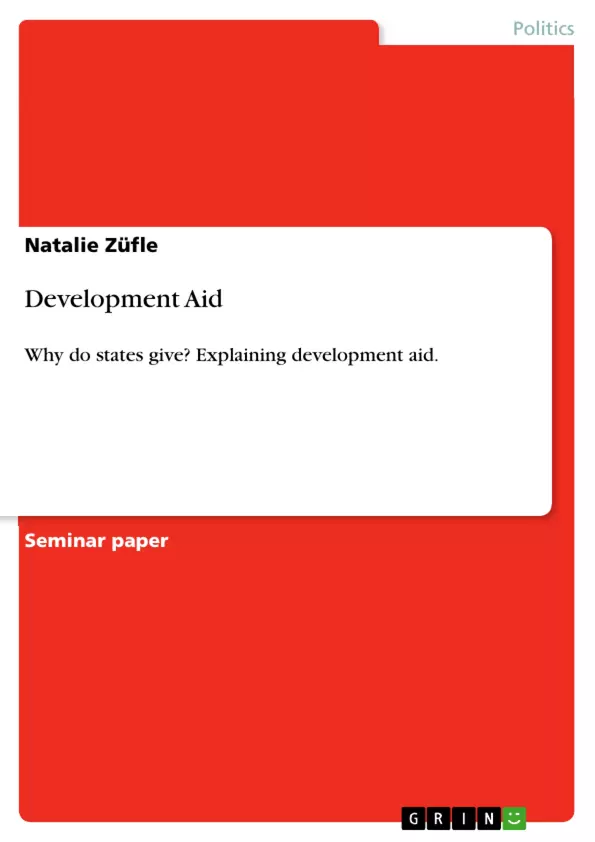In the year 2000 the UN set eight ambitious millennium development goals which shall be reached through a profound development policy until 2015. Among others, the number of people living in poverty should be reduced by 50% and diseases like AIDS or Malaria be stopped. Affluent countries ought to give at least 0.7% of their GDP to poor countries. But this figure has not been achieved by now even approximately. Only a handful of countries give more than this percentage. The average country effort lies at 0.46%, in which the Nordic countries top the set mark (OECD 2007).
Development cooperation is indeed an important part in foreign policy of states. Many of the industrialized states have established special ministries for development cooperation or affiliated a likewise branch to their foreign ministries. Additionally, big donor countries often maintain their own national aid agencies.
Development aid is given in the form of economic, political or social support to developing countries – either in a bilateral (direct) way or multilateral through international organizations like the UN. Measures (financial aid, technical aid or in the form of consultancy and training) comprise as distinct fields as governance and human rights, economics, health care, environment, education or disaster management.
Inhaltsverzeichnis (Table of Contents)
- Introduction
- Argumentation
- Political reasons
- Former Colonies
- Avoiding Conflicts
- Strengthening of Democracy
- Economic interests
- Egoism
- Social aspects
- Political reasons
- Conclusion
Zielsetzung und Themenschwerpunkte (Objectives and Key Themes)
This text explores the complex motivations behind states' decisions to provide development aid to developing countries. It aims to analyze the various reasons that drive states to offer assistance, including political, economic, egoistic, and social factors.
- Political motivations for development aid, including the legacy of colonialism, conflict prevention, and the promotion of democracy
- Economic interests driving aid, such as securing access to natural resources and expanding export markets
- The role of egoism in development aid, including strategic considerations and the pursuit of national interests
- The social dimension of development aid, emphasizing the alleviation of poverty and humanitarian crises
- The interconnectedness of various motivations and the multifaceted nature of development aid policy
Zusammenfassung der Kapitel (Chapter Summaries)
The text begins by introducing the concept of development aid and its importance in the context of the UN Millennium Development Goals. It then delves into the diverse reasons behind states' decisions to provide aid, examining political, economic, and social motives.
The chapter on political reasons explores various motivations, including the historical relationship between former colonizers and their colonies, the role of aid in preventing conflicts, and the efforts to strengthen democracy in recipient countries. It highlights the complex interplay between national security, political stability, and development aid.
The chapter on economic interests focuses on the role of development aid in securing access to natural resources, expanding export markets, and fostering economic growth in recipient countries. It examines the strategic considerations and the potential for self-interest in development aid.
The chapter on egoism delves into the motivations of states that act primarily in their own interests, seeking to influence the actions of recipient countries for their own political or economic benefit. It examines the use of aid as a tool of foreign policy and the potential for manipulative or coercive practices.
The chapter on social aspects discusses the moral and humanitarian motivations behind development aid, emphasizing the need to address poverty, alleviate suffering, and promote social justice. It highlights the role of international organizations and NGOs in providing emergency relief and long-term development assistance.
Schlüsselwörter (Keywords)
This text focuses on the multifaceted nature of development aid, examining the political, economic, social, and egoistic factors that drive states to provide assistance. Key concepts include development cooperation, foreign policy, international relations, colonialism, conflict prevention, democracy promotion, economic interests, self-interest, humanitarian aid, and social justice. The text also explores the roles of various actors in development aid, including donor states, recipient countries, international organizations, and non-governmental organizations.
- Quote paper
- Natalie Züfle (Author), 2007, Development Aid, Munich, GRIN Verlag, https://www.hausarbeiten.de/document/180081


